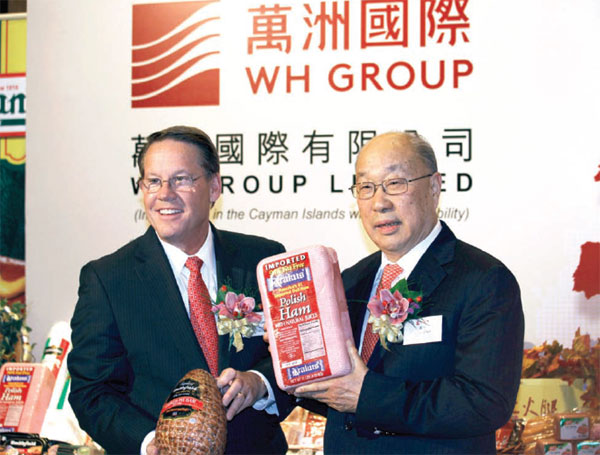Do's and don'ts of doing business in the US
Updated: 2015-10-16 11:54
(China Daily USA)
|
||||||||
|
Wan Long (right), WH Group (previously known as Shuanghui International) chairman and Larry Pope, CEO and Smithfi eld Foods President and CEO, with their products before holding a news conference on WH Group's initial public off ering in Hong Kong in 2014. Provided To China Daily USA |
More Chinese companies are setting up operations in the United States, and face a workforce far different from the one in China, reports Paul Welitzkin from New York.
I n 2013, Shuanghui International spent $4.7 billion to acquire Smithfield Foods, the world's largest pork processor in the biggest takeover of a company in the United States by a Chinese firm. The US and others scrutinized the deal while unions and consumer advocates voiced concern about job security and food safety.
"There was some concern when the Chinese took over," Larry Doggette, the business manager of the union that represents about 200 of the 300 workers at the Smithfield plant in Hampton Roads, Virginia, recalled in an interview with China Daily. "Now they (the workers) would never know the Chinese were in charge if wasn't in the newspaper. There has been no change."
"That's the way it should be working," said Hal Sirkin, senior partner and managing director of the Boston Consulting Group and a professor at Northwestern University's Kellogg School of Management.
"This reflects a certain level of cultural awareness on the part of the Chinese company," said Andrew Molinsky, professor of international management and organizational behavior at Brandeis University. "Whether it's an American in an office in China or a Chinese manager in a facility in the US, you can't just impose your will and assume your own cultural style will succeed."
A report released earlier this year by the Rhodium Group in partnership with the National Committee on US-China Relations detailed Chinese commercial investment in the US down to the congressional district level. The study showed that Chinese companies are operating in 340 of 435 US congressional districts, employing more than 80,000 Americans. From 2000 to 2014, Chinese firms spent nearly $46 billion on new establishments and acquisitions in the US.
Some companies such as appliance manufacturer Haier set up operations in new facilities. Haier constructed a 56,000-square-foot headquarters in Wayne, New Jersey, and a technology center in Evansville, Indiana. Others like Shuanghi acquired an established business with plants and employees across the US.
In both, the Chinese not only became stewards of an asset, but also managers of a workforce more diverse ethnically and culturally than in China.
Diverse workforce
"It's not just hard for Chinese companies, but also for European companies to get their arms around the diversity in the US workforce," said Sirkin.
Michael Zakkour, vice-president of the China-APAC practice for Tompkins International in Raleigh, North Carolina, which has consulted with Chinese on US acquisitions, said there is a lack of diversity in the Chinese workforce compared to the US.
"About 95 percent of the people in China are Chinese," said Zakkour. "Here in the US you find a rainbow coalition in just about every workplace."
Collaborating with and managing a diverse work force is a reality of the interconnected global economy in which enterprises operate in different countries.
"People need to be aware of their surroundings and recognize that it may take a blend of managerial styles to accomplish a task or goal," said Molinsky. He refers to this skill as global dexterity or the ability to adapt your behavior to the demands of a foreign culture without losing yourself in the process.
According to Sirkin, two issues Chinese companies must consider in a multi-cultural and religious US: holidays and days of worship. "You need to understand them before you can manage them."
He also said Chinese firms must contend with US laws on employer=employee relations. "There are lots of laws in the US on discrimination and on work rules and requirements. Chinese companies need to understand that or else they could face lawsuits," Sirkin said.
And if the workers are represented by a union such as Doggette's local at Smithfield Foods in Virginia, the legal complexity can increase.
Molinsky said it's important not to stereotype a person or group. "In the US you may come across a person of Indian descent. This person may be a second- or third-generation American and may be much more in tune with Western culture and values. Perhaps they attended school in the US, which would also have an effect," he added.
Molinsky also cautioned against making assumptions based on ethnic identity. "It would be similar to an American going to China and working in a State-owned enterprise (SOE) with an older workforce, which will tend to be more traditional as opposed to a startup in Shanghai made up of mostly young people, some of whom may have graduated from college in the US," he added.
Many overseas companies in the US recognize the complexity of workforce management and hire firms to provide training and advice.
Global Dynamics Inc of Aventura, Florida, is one of them. Neal Goodman, president of the consultancy, said because Chinese are increasing overseas investments in the US, there will be more opportunity for mistakes with workers.
"Chinese companies are reluctant to acknowledge that cultural training may be required until they make a mistake," Goodman said. "Some companies are aware of this and take the initiative to implement some cross-cultural training, particularly for Chinese managers that are headed to the US. However, about 95 percent of Chinese aren't aware of these differences and don't see the value in getting advice."
The Chinese president of a major Chinese manufacturer in the US said his company didn't use a consultant.
The executive, who spoke on condition that neither his name nor the name of his company be used, told China Daily USA that his company didn't have problems with its workforce of about 7,500 employees in several states and worked well with unions.
"If you treat your people as your people, I do not think it will matter that much," he said. "We have the same responsibility to take care of their interests no matter which country they might be from."
The executive said there are two keys to successfully managing a workforce:
"Transparency. You need to tell all people what is going on since they are all important stakeholders. Award people. If you know how to share, you will win the cooperation and respect."
"If you don't understand the culture, history and norms of the society where you want to do business you are likely to fail. It's also true of US companies seeking to establish operations in China," said Zakkour.
One key difference between labor interaction in China and the US is the role of the group and the individual, he said: "Americans want to be recognized for their accomplishments and expect to be acknowledged on an individual basis. In China, the focus is on the group and even if an individual effort stands out, the recognition will spotlight the group rather than one or two employees."
"Group harmony is very important in China," added Molinsky.
Another big difference is the notion of leadership. "In the US, employees expect to be heard and to give feedback. In China, subordinates will not speak up until the boss speaks up," Goodman said.
"In school in China you are taught to listen to the teacher and not to ask questions, which is the opposite of what you are taught in the US," said Zakkour.
"It's all about expectations. US workers have higher expectations on what it will take to be productive than a Chinese worker. The US is more consensus based; China is more top down," said Sirkin.
Interpersonal communication or the exchange of information, feelings and meaning through verbal and non-verbal messages, can be a minefield for even the most experienced manager. There are differences in some basic communication fundamentals between the Chinese and the US, according to Goodman.
Trusting colleagues
One involves a sense of trust. "The US is a high-trust culture where generally people trust their colleagues until proven that they can't be trusted. In China, it is the exact opposite. The Chinese don't trust anyone until they prove they are trustworthy," he said.
Another challenge is direct versus indirect communication. "In the US people express their opinions freely and if they disagree they express it in a way without offending someone. In China, people will hold back on correcting someone - even if they know they are wrong - for fear of insulting them," added Goodman.
Once communication issues have been dealt with, Chinese owners of US companies or executives of Chinese firms with US operations must get down to business basics: setting goals and objectives for employees, determining strategy and who will manage the workers and how best to accomplish all of this within a budget.
Occasionally, the tasks of running a business can help to overcome cultural differences between an employee and their bosses. "Sometimes a business code will help cut through cultural obstacles. Uniting behind trying to introduce a new product or service may help to overcome cultural barriers in the organization," said Molinsky.
Like all businesses that purchase another company, Chinese owners must decide whether to keep existing management, change management entirely or employ a blend of managers from within and outside the organization.
Sirkin of Boston Consulting said it is usually best to go slow on changes. "One the worst things you can do, and this applies to US companies going into China as well, is to come in and tell everyone how smart you are and how you want to change things," he said. "Earn the right to make changes and communicate the value the changes will bring to the employees and the company."
If the company is making money, then there is a reason why senior management has been in charge. "You don't want to change things before you understand the situation," added Sirkin.
Zakkour of Tompkins International offered a case study in how the Chinese should not approach business strategy in the US. A few years ago a manufacturer of automotive after-market products approached Tompkins. The Chinese firm employed about 2,000 in the mainland making products for distribution in the US.
"They decided to set up a sales and distribution system for their own branded line of products in the US," said Zakkour. "It was a failure. They didn't want to hire local talent and insisted on bringing over Chinese who had little knowledge or experience in the US market. They were not positioned to succeed in the US.
"In addition to not understanding the business and cultural landscape, they were reluctant to hire people (other consultants) that could have helped them to navigate the landscape," continued Zakkour.
Zakkour said that now Chinese foreign direct investment (FDI) is mainly focused on acquiring existing companies and real estate.
"China is the second-largest economy in the world and doesn't have a national brand succeeding on a global scale. One of the reasons why we don't see a lot of Chinese brands in the US is that they are hesitant to hire professional service providers (like advertising and marketing specialists). It's a control issue - and reflects back to the way they operated in China. 'I got along well without these firms and succeeded in China so why do I need them here in the US. I am willing to pay for things I can touch and feel but I am not willing to pay for services,'" he said.
Success stories
Zakkour noted examples of Chinese success stories in the US. He pointed to the purchase of the AMC movie theater chain by Dalian Wanda Group Co Ltd. In 2012 Dalian Wanda - China's largest entertainment group - acquired AMC Entertainment Holdings Inc for $2.6 billion including debt to create the world's biggest cinema owner. "This has largely been a smooth transition," noted Zakkour.
Earlier this year Chinese holding company Fosun International Ltd acquired a stake in British tour operator Thomas Cook Group PLC after purchasing resort operator Club Mediterranee SA. "They kept things pretty much in place and understood that it was important to keep doing what you have been doing," Zakkour said.
In the case of Smithfield and Doggette's union members, he gives the Chinese company credit for a relatively smooth takeover. When the deal was first announced, Shuanghui representatives went to Virginia and met with company executives and workers.
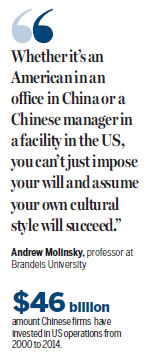
"The Chinese came in and shook hands with us and said there will be no changes. And basically there haven't been any," said Doggette.
He said the union negotiated a new contract with the company earlier this year. "We negotiated with the HR (human resources) people and they were all Americans. I have worked on a couple of arbitration cases and again worked with HR people at the company who are Americans."
Sometimes a business has to deliver bad news to employees. "You need the sensitivity to say the right things - it's less about what you do and more about how you do it," noted Sirkin.
Cultural orientation
Because China is investing heavily in the US, Zakkour said it will be some time before everyone can get an accurate reading on how well the Chinese are adjusting culturally to the US.
"China's SOEs are really just starting to spread their wings globally, such as Sinopec (China's second-largest energy company) doing oil-production deals overseas. We don't have an extensive amount of data to gauge how the Chinese are doing at cultural orientation in the US," he said.
In an upcoming trade publication, Goodman of Global Dynamics outlines several steps Chinese companies can take to nurture successful employees. They include selecting candidates for overseas assignments based on more than language proficiency, offering programs on cross-cultural training, and providing in-country coaching to identify areas for improvement in cultural awareness.
"I think it was interesting when US company executives from Microsoft and Google met with Chinese President Xi (Jinping) recently when he visited the US," Goodman said. "You could sense that there was some uneasiness on both sides. An effective cross-cultural training program can eliminate the uneasiness and break down other barriers to business success."
Contact the writer at paulwelitzkin@chinadailyusa.com
- EU offers Turkey cash, closer ties for migration help
- ROK, Japan to hold defense ministers' talks next week
- 5 countries elected as non-permanent members of UN Security Council
- Obama slows pace of US troop withdrawal in Afghanistan
- Democratic rivals back Clinton on emails
- Myanmar gov't signs ceasefire accord with armed groups
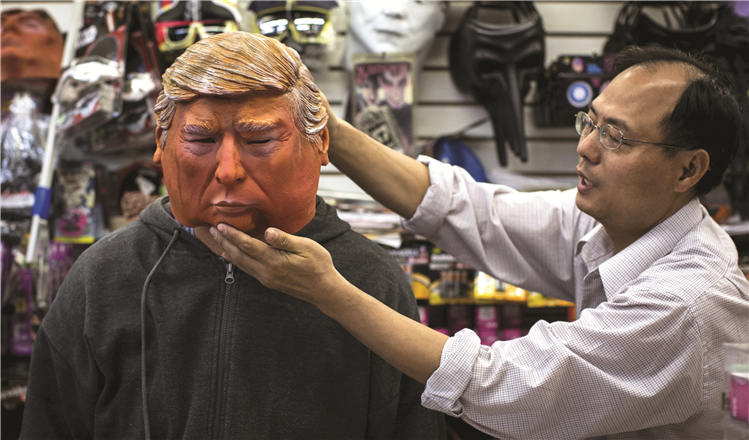
 Trump card
Trump card
 Shaolin monks display kung fu skills in London
Shaolin monks display kung fu skills in London
 'Newlyweds' are 'floating' on air in Zhengzhou
'Newlyweds' are 'floating' on air in Zhengzhou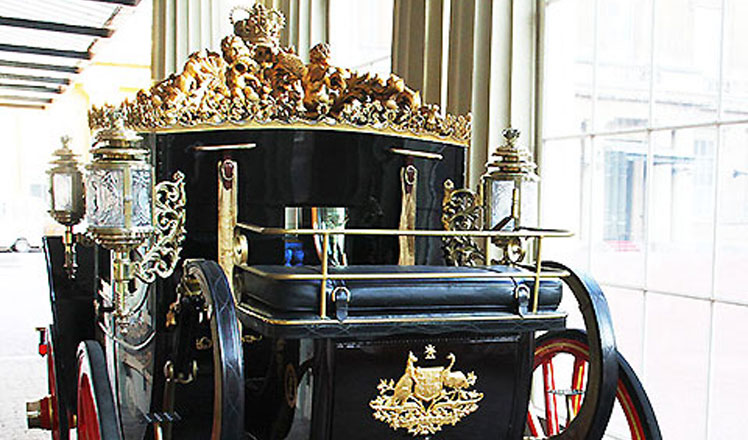
 Buckingham Palace prepares for Xi's visit
Buckingham Palace prepares for Xi's visit
 Shanghai Fashion Week: We COUTURE
Shanghai Fashion Week: We COUTURE
 World's top 10 innovative economies
World's top 10 innovative economies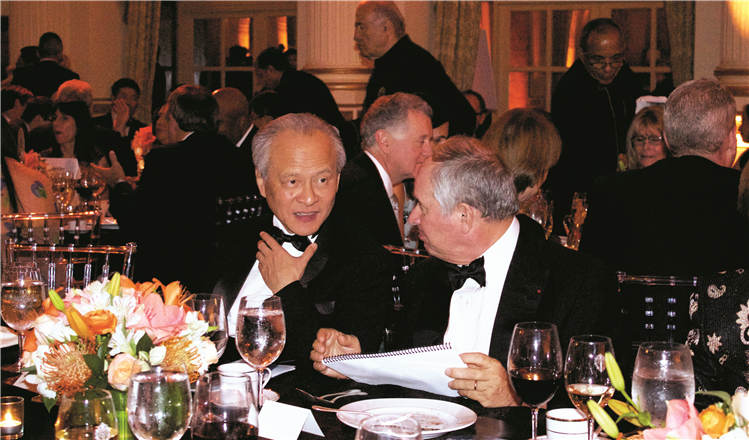
 Cui: China, US should share global vision
Cui: China, US should share global vision
 Speaking Mandarin attracts Chinese homebuyers in the US
Speaking Mandarin attracts Chinese homebuyers in the US
Most Viewed
Editor's Picks

|

|

|

|

|

|
Today's Top News
Tu first Chinese to win Nobel Prize in Medicine
Huntsman says Sino-US relationship needs common goals
Xi pledges $2 billion to help developing countries
Young people from US look forward to Xi's state visit: Survey
US to accept more refugees than planned
Li calls on State-owned firms to tap more global markets
Apple's iOS App Store suffers first major attack
Japan enacts new security laws to overturn postwar pacifism
US Weekly

|

|
